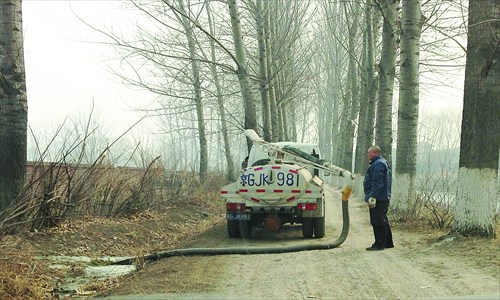
A man pours an unknown green-colored liquid from a tanker truck into a drain that lets out into a waterway in Changping district Sunday. Photo: Courtesy of Zhang Yi
A resident has alleged that he witnessed people illegally burning garbage and pouring an unknown green liquid from a tanker truck into a waterway in Changping district Sunday.
The witness, surnamed Zhang, who lives close to Guomao in Chaoyang district, was driving near the Hulu River, a small waterway which is outside the North Sixth Ring Road, in Xiaotangshan township, Changping district, when he saw what appeared to be people wearing municipal cleaner's overalls burning leaves and garbage, including plastic foam.
"I thought it would worsen the already bad air in Beijing, so I called the chengguan (urban management officers) immediately," Zhang said.
"I waited there, then a vehicle arrived. I thought it was the chengguan, but to my surprise, a man came out and started to pour a green-colored liquid from a small tanker truck into the drain connected to the river," he said.
"It was outrageous! The liquid was so dirty and smelly, how could anyone do that in public in broad daylight?" Zhang said.
He photographed the vehicle and the smoke from the burning garbage and posted it to his Sina microblog Sunday afternoon, asking for help to identify the owner of the truck.
As many as 1,400 people forwarded the message to express their anger over the deliberate pollution and their general dissatisfaction with Beijing's environment.
A member of the chengguan surnamed Zhao, who answered Zhang's call, said when they went to the scene, the people involved had already left.
"So we could do nothing. We get burning garbage cases almost every day. When we go to the scene we order them to stop doing it and fine them. But we don't have any power, so we can't enforce anything," said Zhao.
"The villagers still burn garbage, but pouring out polluted liquid is rarer, so we don't know how to punish such behavior yet," he said.
The Hulu River is an upstream tributary of the Wenyu River, the main waterway in Changping district, from where it flows to the Haihe River in Tianjin and then out to sea.
"The Wenyu River makes up for 98 percent of Changping district's surface water area," said an official surnamed Li from Changping district water authority.
"We didn't get the report yet [about this], but we will investigate. If it's confirmed, we'll join the environmental department and crack down on those illegal activities," Li said.
"We've heard of similar cases before, villagers and factories discharging sewage into the Wenyu River. We and the environmental protection department have been cracking down on such cases recently," he said.
Another official from Changping water authority, surnamed Guo, said small rivers like the Hulu are not included in the city water authority's rating system yet, but confirmed that it is not used as a tap water source or for irrigation.
"River water in Beijing is too polluted for drinking. Across Beijing, residents' tap water comes from underground water or reservoirs, including the water from the northwestern mountainous area and wells. The Hulu River's main function is to discharge floodwater," said Guo.
"It's very common for people to let out sewage or industrial waste water along the Wenyu and other rivers in Beijing. This phenomenon has existed for a long time and it's hard for the government to administrate all of them," said Zhang Junfeng, founder of the non-government water watchdog Happy Water Journeys.
"Beijing water authority has classified the major rivers in Beijing into nine levels. The first is the water source and is safe to drink directly, and the second is safe to drink after treatment. The third is safe for people to touch. The fourth level is not safe to touch and can be used in industrial or agricultural production. The fifth is a little worse than the fourth and is a little smelly. The sixth to the ninth is absolutely unsafe to touch," he said.
The Wenyu River is rated eight, according to the Beijing water authority website on January 15, 2013.
"All rivers, big or small, should be included in the rating system, but it needs a government allowance to pay for staff and monitoring equipment," Zhang noted.

Copyright ©1999-2011 Chinanews.com. All rights reserved.
Reproduction in whole or in part without permission is prohibited.